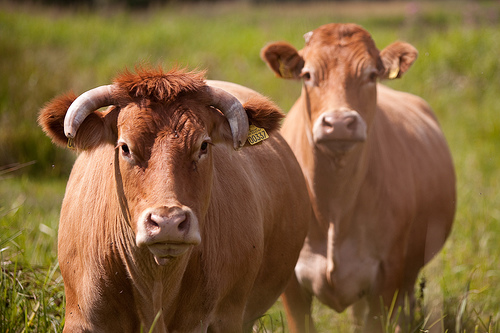 Culture & Ethics
Culture & Ethics
 Evolution
Evolution
 Faith & Science
Faith & Science
War on Humans: Denmark Joins Sweden, Norway, and Other Nations in Banning Kosher Slaughter

The news from Denmark today is that the country has banned Jewish and Muslim ritual slaughter. The Danish minister for agriculture and food, Dan J�rgensen, explained that “animal rights come before religion.” There could hardly be a clearer statement of why the new documentary from Discovery Institute, The War on Humans, written and directed by John West, is so timely.
The law completes the picture in Scandinavia. Until now, with kosher slaughter being illegal in Sweden and Norway, Jews in those countries imported meat from Denmark. No more. Kosher slaughter, shechita, was also banned by the Nazis in Germany in 1933, in Poland in 1939, and so too in the Nazi-occupied and Axis countries. Are you seeing a pattern? Wikipedia has an informative article. Apart from Scandinavia, shechita today is illegal in Switzerland, Poland, and New Zealand (with an exception for chickens). Interestingly, it is protected in Germany as an expression of religious liberty and human rights.
So a way to rephrase the Danish minister’s comment would be, “Animal rights come before human rights.”
In the companion e-book to the documentary War on Humans, Wesley Smith crystalizes the connection between discounting the unique value of human life and exalting animal “rights”:
As the bioethics movement dehumanized the most weak and vulnerable among us, the animal rights movement — as distinct from animal welfare advocacy — agitated against rights being thought of as exclusively human. Animals possess equal rights to humans, movement activists argue, because the ability to suffer is the quality that conveys value. Since both cows and humans experience pain, they are equal — meaning dairy farming and cattle ranching are as odious as human slavery.
The confusion of animal and human goes back to Darwin, resulting in an ideology of animalism.
Regarding the new law in Denmark, the irony is that rightly understood, kosher slaughter should heighten a proper humane sensitivity to animal pain. What the Scandinavian and other countries say they find objectionable is that in shechita the animal must be awake at the moment of slaughter. Denmark and other nations only allow slaughter where the creature has been stunned beforehand, which renders meat trefe, non-kosher. If it could be done totally by robots, so that people could hide their eyes entirely from what was happening, no doubt the Scandinavians would like that even better.
I can’t speak to the Muslim rationale, but Jewish law forces the recognition that it’s no light thing to kill and eat an animal. Hence the many minute regulations that surround it. The slaughterer, or shochet, has no alternative but to confront what he’s doing. Taking the life of a creature under these circumstances should be an intimate, human act. We should be fully conscious of it. For all that an observer could tell, a stunned animal might as well be dead already.
As Wesley Smith has tirelessly explained, in the film, the book and his blogging at National Review Online, only human exceptionalism underwrites the concept of human obligations that in turn make a concern for animal welfare thinkable.
I’m now on Flickr. Find me @d_klinghoffer.
